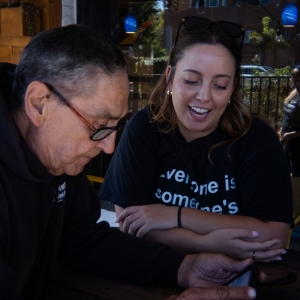Guaranteed income study finds meaningful results for people experiencing homelessness in ‘cash plus’ approach
October 23, 2025 / by USC Social Work- Research
Participants in “Miracle Money: California” find stability in first study to test the role of basic income and social support among unhoused people.
Monthly income plus a “phone buddy” program improved key areas in the lives of people experiencing homelessness, according to a new USC study.
Researchers from the Center for Homelessness, Housing and Health Equity Research at the USC Suzanne Dworak-Peck School of Social Work have released results from their Miracle Money: California study designed to better understand the impact of direct cash distribution plus social support to people experiencing homelessness in San Francisco and Los Angeles.
A main takeaway from the study is that cash, when paired with relational support, creates meaningful improvement in three key areas:
- Meeting essential needs like food, housing and transportation;
- Providing stability to weather unexpected crises and plan for next steps; and
- Developing meaningful relationships through social support, described as “life changing.”
The study is the first randomized controlled trial of basic income in the United States to explicitly test the role of relational support shown to buffer stress and foster stability. The three-year study provided 103 unhoused participants with $750 per month for 12 months, plus social support through the Miracle Friends phone buddy program.
Viable policy option to address homelessness
Delivered through the nonprofit organization Miracle Messages, which helps people experiencing homelessness rebuild their social support systems and financial security, the “Miracle Money: California” study is an expansion of a previous informal pilot program conducted by Miracle Messages that successfully helped participants to exit homelessness and meet their basic needs.
Led by Benjamin Henwood, the Frances L. and Albert G. Feldman Professor of Social Policy and Health at the USC Suzanne Dworak-Peck School of Social Work and director of the Center for Homelessness, Housing and Health Equity Research, the study focused on scaling distribution to a greater number of people experiencing homelessness, following promising results from a pilot study released in 2021, and building in time to learn about both the process and impact of direct cash transfers in this context.
“This carefully designed study is an important step in establishing ‘cash plus’ as an empirically supported intervention,” Henwood said. “The results demonstrate that concerns about this population’s use of unrestricted money were unfounded and that the cash plus approach can be considered a viable policy option to address homelessness.”
The report provides a breakdown of findings over 15 months from three distinct groups of participants in the program: those receiving basic income plus social support, those receiving social support only, and a control group who were waitlisted.
Results dispel myths associated with basic income
Outcomes were measured in housing stability, financial security, employment, physical and mental health, substance use and future outlook. Spending patterns among cash recipients were also tracked. Additionally, the report includes confirmed findings addressing common myths associated with basic income as a potential solution to homelessness.
“The results have shown that financial resources are a powerful complement to support unhoused neighbors,” said Mary Carl, CEO of Miracle Messages. “Overwhelmingly, people used the funds to meet their essential needs, creating stability, hope and dignity. We have started to shift the hearts and minds of the community. Direct cash assistance plus love is a simple and profound act of trust and humanity.”
The study concludes that while a permanent exit from homelessness is possible through a guaranteed income program, it would be most effective through a “cash plus” approach, pairing income with targeted housing pathways, social support and access to essential services. Many participants in the Miracle Money: California study used the monthly funds received to stabilize their routines, cover transition costs and respond to unexpected emergencies. Through their assigned phone buddies from Miracle Messages, they received a foundational layer of social support that complemented the financial assistance.
The Miracle Money: California study was funded by Google.org, Wayfarer Foundation, The Eli and Edythe Broad Foundation, Hilton Foundation, USC Homelessness Policy Research Institute, and private donors Scott Layne and Kimberly Lynch. Learn more about the Miracle Money program.
To reference the work of our faculty online, we ask that you directly quote their work where possible and attribute it to "FACULTY NAME, a professor in the USC Suzanne Dworak-Peck School of Social Work” (LINK: https://dworakpeck.usc.edu)
